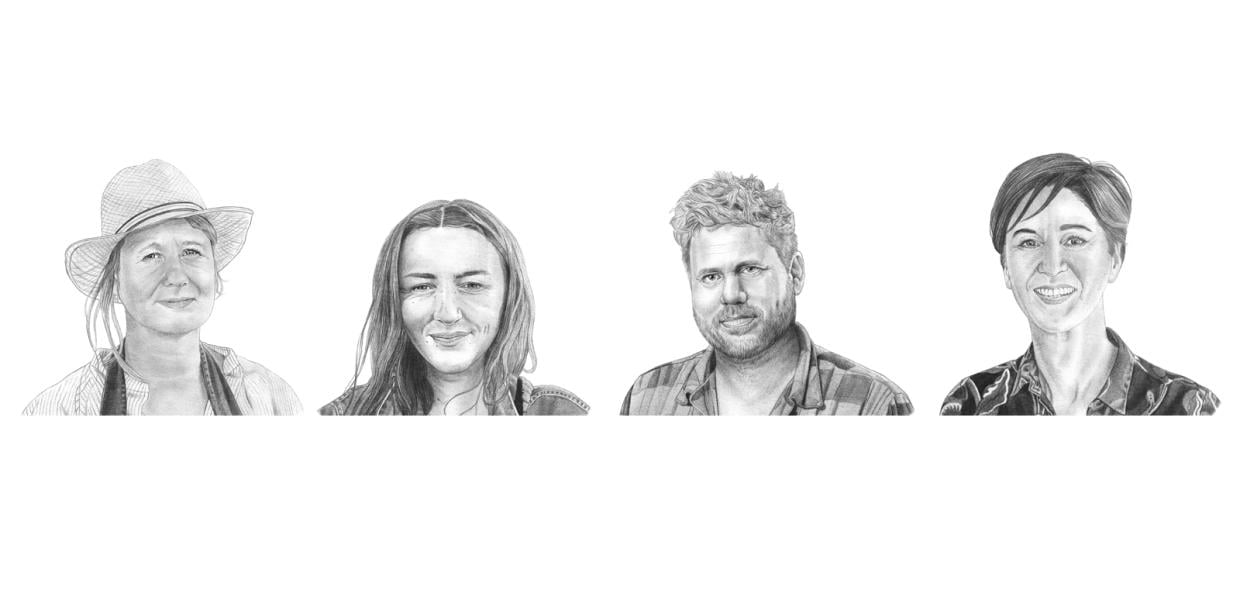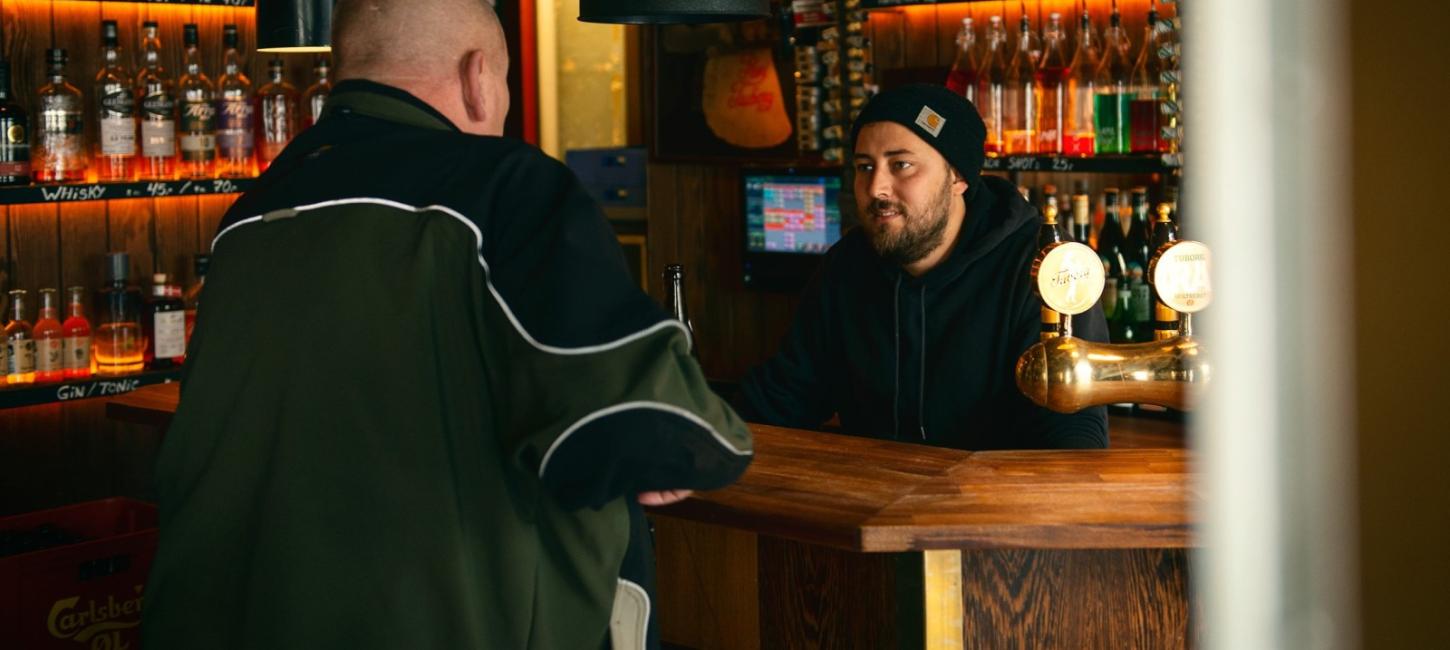
Det Ny Scala - Exploring the Underbelly of Brown Bars in Copenhagen.
By Rasmus Poulsgaard
Local expert on cocktails, spirits and Copenhagen’s bar scene. One of our local contributors covering Copenhagen's culture, gastronomy and urban development.
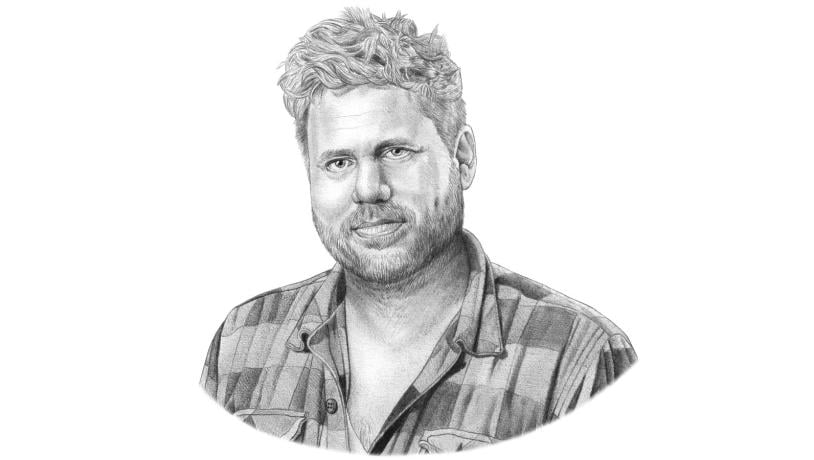
Photo:Sine Jensen
Even though we nowadays in Copenhagen pride ourselves of having an overwhelming amount of bars of international standards serving everything from twisted Manhattans, New England Pale Ales, and obscure murky wines from parts of the world you never heard of, when my parents were young, there were no clubs, no cocktail bars, and hardly any wine bars around. The pub or “værtshuset”, as it is known in Danish, was where people from all walks of life went to get drunk - together. It was a time where you could only get two red wines at the supermarket, and the most popular was known as “the one with the bull” because it had a bull on the label. Nobody knew from which grape it was made, what wine region it came from, or how it was produced, and quite frankly nobody cared.
Today in Ravnsborggade, situated in the patch-worked borough of Nørrebro, where restaurants, vintage shops and niche wine bars lie neck and neck like beads on a string, they do care. This just so happens to be my neighbourhood, but it is also where the bar The New Scala or Det Ny Scala is located.
Read more: Neighbourhood guide to Nørrebro
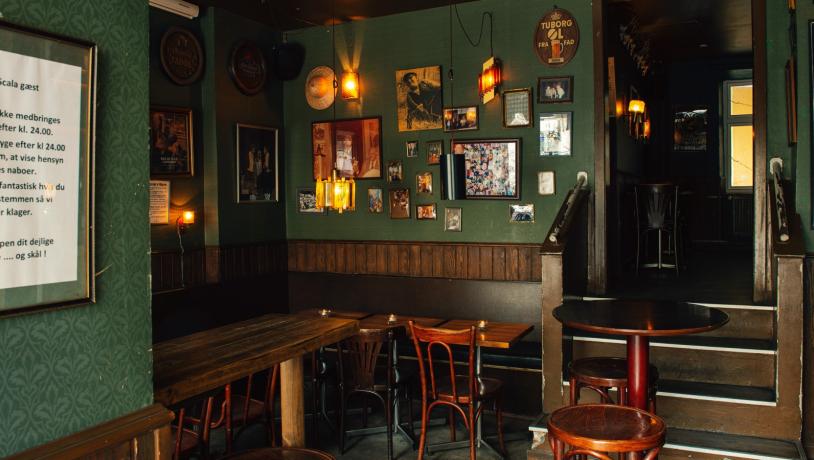
Det Ny Scala might be new, but it's nailed the "old" look pretty good.Photo:Rasmus Poulsgaard
It is of course called The New Scala because it is a revamped version of an old bar called Scala, and I am on my way there to investigate why “værtshuset” is still very much a part of young Danish peoples’ repertoire when going out in 2019, despite having significantly more options than my parents did. I want to explore a current trend and why so many new bars in Copenhagen opening up today base themselves on a concept that seems so archaic, and why in this globalised, rapid paced and forward-thinking world of ours somewhere on Nørrebro time seems to stand still. Or does it?
As I bike there, I think about how to write an article about something as trivial and banal as a normal bar. Not a fancy cocktail bar, or an exotic wine bar, but just a bar. A bar that is nothing special, a bar that does not dazzle people with an elaborate wine menu or cocktail list, but just sits there in its unpretentious simplistic beauty. A quintessential Danish bar if you will.
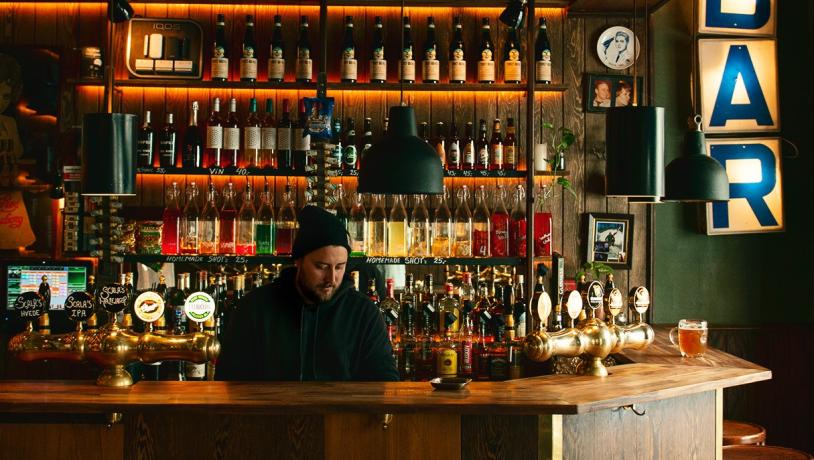
Bjørn greets his guests with open arms and a cheeky smile.Photo:Rasmus Poulsgaard
When I arrive, Bjørn, whom I am here to meet, is putting candles on the tables. I sit down at the bar and unpack my stuff, and as he returns to the bar he uncorks a beer and takes the first sip of the day - well deserved. “Can I get you anything?” He says smiling. Bjørn Severin who has been the bar manager at the bar for about 5 years describes the bar as deliberately casual, as he pours my draught beer and finishes it with a perfect head. You can tell he masters the underestimated art of pouring beer. I like that.
As my eyes scan the bar, they are met by an intense amount of dark brown wood bathed in incandescent golden lights. The walls are draped with dark green tapestry and old pictures which reminds me of excerpts from my grandmother’s photo album. Time has taken its toll on the images and the analogue film light leaks lends a distinct sense of history to the bar, and yet there is something subliminally modern about this place.
The older version of Scala, which can be seen on the images, had been a mainstay in the now quite modern restaurant street of Ravnsborggade since the late seventies, and was one of the last brown pubs in the street, when the new owners took over 6 years ago. Before that, the couple Arne and Irene had been running the place for more than three decades, which was beginning to show in the nooks and crannies of the old bar, as time and cigarette smoke had coated it in grime.
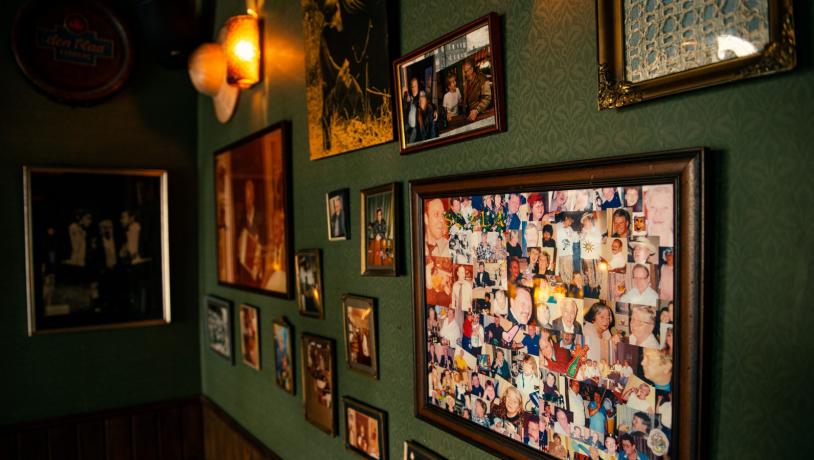
The old version of Scala is honoured in the weathered frames on the walls.Photo:Rasmus Poulsgaard
“This place used to be a schizophrenic smoking pub”,
Bjørn says smiling. I myself remember dropping by at one point during the fading days of the once very popular bar. The whitish nicotine stained lace curtains and the excessive fluorescent lighting brought me in like a moth to the flame, but upon entering it wasn’t exactly a warm welcome I faced. There was a distinct feeling of “why are you here?”, and the apparent no music policy didn’t help warm up the place either. It was definitely one of those places where unless you were one of the initiated, you had one beer and went on your way again, maybe even before finishing it. Bjørn laughs at my story and nods his head in a concurring manner.
He does however also stress how important it was for the new owners, who also owns a cafe called “Gavlen” further down the street, not to alienate the old regulars, when carefully restoring the place where many of the local folk had spent most of their day drinking beer and smoking cigarettes. And so, they went out of their way to create a place where the old patrons wouldn’t feel estranged, but instead were welcomed in to be part of a new chapter in the history of Scala.
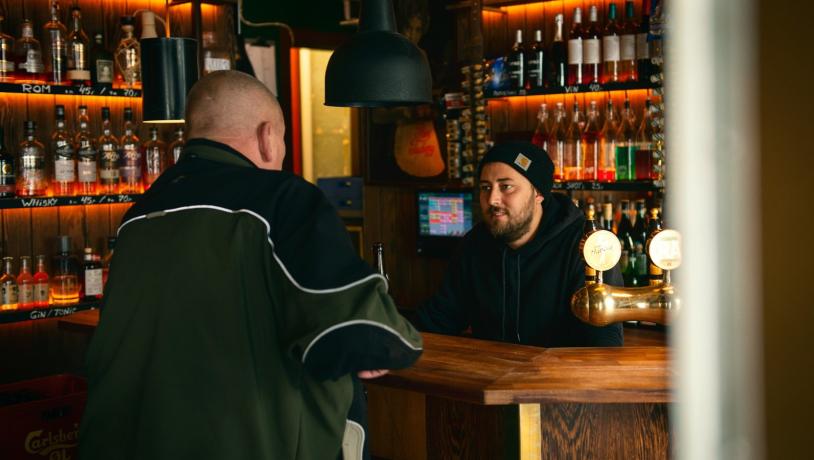
One of the beauties of the "værtshus" is the diversity of the crowd. Photo:Rasmus Poulsgaard
This ability to embrace social and demographic differences is very much what defines this place, and a lot of the other brown bars of Copenhagen. Shortly after I have arrived, two young seemingly well-educated men in their late twenties drop by, and after them a young woman who sits at the bar and picks up the newspaper. An older man enters who is clearly a regular, and is also, let us say, cut from a different cloth than the three younger guests in the bar. He knows Bjørn by name and vice versa. A rather cheeky banter ensues between the two, in which he with a rusty voice complains about the slot machine pay out rate, and how Bjørn probably empties them into his own pockets after work instead of letting honest hard working men like him win the money. He looks down, pauses and tells Bjørn with a saddened tone about the recent death of his 15-year-old budgie. A bird he until its sudden death had shared with two other regulars of the place. He buys a beer and a packet of cigarettes and heads for the slot machines in the back.
I take a sip of my beer and turn to Bjørn to ask him about the potential conflicts inherent in appealing to such a diverse segment. He shrugs it off; “on the contrary he says. In these bars there is a high level of self-regulation. If “the kids” are too loud, the old folks make sure to tell them, and they respect it. There is a very direct tone in a place like this, and I like that” he says.
For him the key to success is hiring the right people who knows the “værtshus” environment and the crowd that follows. It is about having a high retention rate on bartenders, so they build relationships with the guests, and about tolerating hearing the same story 300 times and still laugh at it.
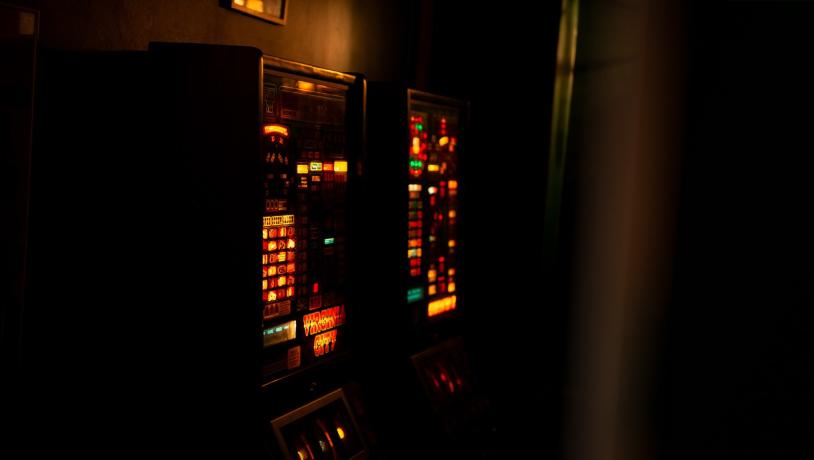
The old slot machines in the back are true to any real "værtshus".Photo:Rasmus Poulsgaard
“What is special about a place like this, is that here there are no rules, as long as you behave respectfully towards other people. Sometimes if you go out downtown in more fancy bars you almost feel like you have to wear a mask, behave in a certain way, and that you can never truly relax. Here people can come in their night-gown and still be treated with respect even though they are a drunken 80-year-old alcoholic. A lot of people still use this as their living room away from home",
Bjørn explains.
It is starting to make sense to me now why young people seek these spaces of refuge, where the beer is the same color as the dark wooden panels, and where you can be yourself, whoever that might be. Where there is a sense of realness, a presence and a togetherness faraway from some of the cold high-concept bars downtown.
Maybe it is because “værtshuset” is deeply rooted in our DNA, and therefore a place we return to when the world gets too big. Maybe it is because old fashioned “hygge” never goes out of fashion, or maybe because this form of old school authenticity is paradoxically what we modern people crave. Whatever it is, I will definitely be back and so should you.
Related stories from the local experts
Let some of Copenhagen's experts on gastronomy, culture and urban development explain just what it is that makes their beloved city unique in its own great-tasting, creative and beautiful way.
